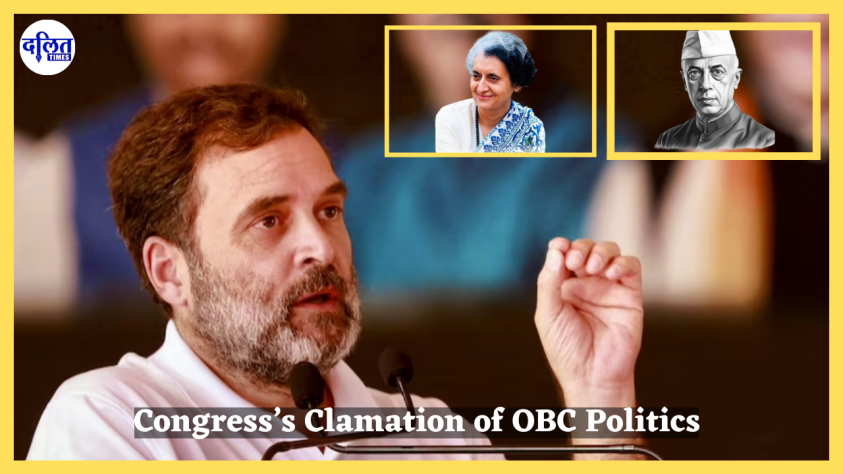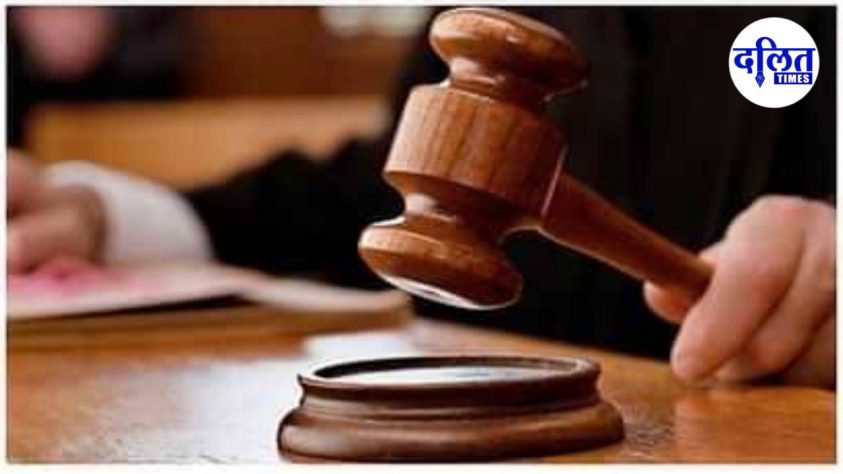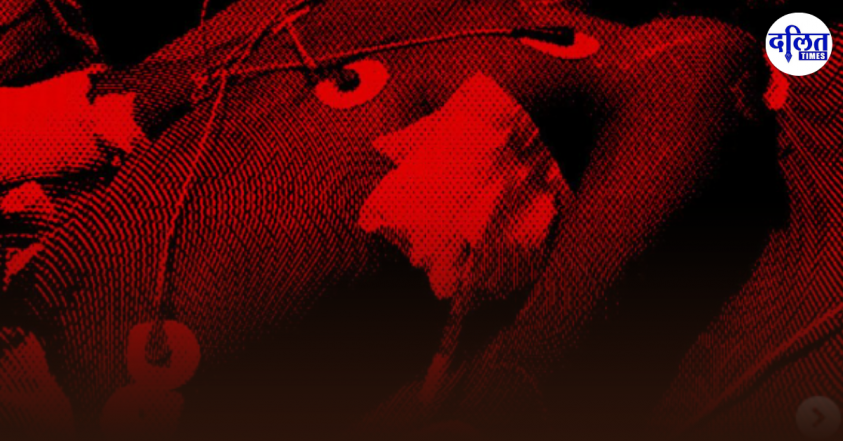For the last few months, OBC issue and caste-based census have become crucial parts of Indian politics, especially for the Congress Party. Rahul Gandhi constantly has raised the issue of OBCs in Lok Sabha several times. He has also made statements regarding the inadequate representation of OBCs in the secretariat of the central government, media, institutions, entrepreneurship, etc. Rahul Gandhi asked questions from the ruling party and claimed that BJP does not want to give representation to OBCs in public and private spheres. He attacked on BJP for not including castes in the census and why there are only three secretaries out of 90 from the OBC category in the BJP government. Thus OBC issues and politics have become more debated concerns in the Indian political sphere.
However, inadequate representation of OBCs is not a new phenomenon which is only during the BJP rule. The condition of the OBCs was not much different during the Congress rule. There are certain questions that one needs to ask. Who are OBCs and what are the policies implemented by the Indian National Congress (INC) during its rule at the center level? This article critically analyses the role of Congress in the identification and betterment of OBCs after independence. In other words, what is the role of INC in the empowerment of OBCs?
Identification of OBCs in Postcolonial India
“OBC” stands for Other Backward Classes in India. It is a word used to describe socially and educationally disadvantaged groups that are eligible for special affirmative action programs and policies aimed at improving their socioeconomic and educational standing. The OBC list in India is not standard, and each state keeps its list of OBC communities.
The Indian government has also released a list of OBC communities seeking reservations in central government employment and educational institutions. This is referred to as the “Central List of Other Backward Classes.” It is crucial to note that the precise communities included in the OBC list differ by state, and there is constant debate and discussion over the classification and inclusion of certain groups. As a result, it is best to rely on official government sources for the most up-to-date and accurate information about OBC communities in a particular area or state of India.
Other Backward Classes (OBCs) are more a heterogeneous community, which constitutes more than 60 percent of the total population in India. It is identified with various names such as backward classes, socially and educationally backward classes, extremely backward classes, most backward classes and so on. These variations can be seen in different regions. In southern India, there are classifications of OBC in various categories. For example, in Tamilnadu, there is 69% reservation for reserve categories, 50% for OBC, 18% for SC and 1% for ST. There is a classification of reservation in OBC and SC (26.50 for backward classes, 3.50 for backward class Muslim, 20% for most backward class & denotified communities, 15% for scheduled caste and 3% for Arunthathiyars scheduled caste).
Historical Routes:
Before independence, major states adopted various criteria to recognise socially and educationally backward classes. The Constitution of India provides special provisions to marginalised sections of society. It is most important to focus on the historical evolution of OBCs after independence and the role of central governments in bringing policies to uplift this community. According to Article 340 of the Indian Constitution, the Government of India has to appoint a commission to identify the condition of “socially and educationally backward classes”. The first backward classes commission was appointed in 1953 under the chairmanship of Kaka Kalelkar. Therefore it is also known as ‘Kalelkar Commission’. This recommendation was not implemented by the Government of India because many members

did not agree that caste should be base for the identification of backward classes. The chairman of the commission Kaka Kalelkar was against the recommendations. OBC issues became more complicated because the Brahmanical forces in Congress did not want to destroy their monopoly. Consequently, the recommendation of Kalelkar Commission disappeared from the social justice policy of Congress. Prime Minister Jawaharlal Nehru did not show his interest either in implementing the recommendations of Kaka Kalelkar Commission or establishing other commission for the identification of backward classes.
Twenty five years later the second backward class commission also known as ‘Mandal Commission’ was set by Morarji Desai government, a non-Congress government (Janata Party) in January 1979. The Commission submitted its report in 1980. Mandal Commission adopted 11 major indicators (4 social, 3 educational, 4 economical) to identify socially and educationally backward classes. In 1980, Congress won the election and Indira Gandhi became the prime minister of India. Indira Gandhi did not take any interest in implementing the recommendation of Mandal Commission and after her death, Rajiv Gandhi followed her legacy, and he did not make any move to the empowerment of these communities. Because major leaders of Congress during their rule were against the OBCs.
Champions of OBCs:
On the other side, there are historical contributions of anti-caste social reformers like Kabir, Ravidas, Chokhamela, Jyotiba Phule, Savitribai Phule, Tarabai Shinde, Narayana Guru, Ayyankali, Periyar, Ambedkar and so on. They sacrificed their entire life for the eradication of social inequalities and the establishment of an egalitarian society. After the independence, Dr. Babasaheb Ambedkar played an important role in shaping the idea of social justice as chairman of the drafting committee. Congress never considered the contribution of Dr. Ambedkar for the upliftment of marginalised communities and he was honoured by Bharat Ratna (the highest civilian award of India) during a non-Congress government. V. P. Singh government announced Bharat Ratna award post-thumously to Dr. Babasaheb Ambedkar on March 31, 1990. V. P. Singh also announced to implementation of the 27 percent reservation for backward classes in the job of central government. However such steps for empowering OBCs of V. P. Singh were compulsion of allied partners. Leaders from lower castes supported to government of V. P. Singh only on the promise of implementation of agendas of social justice. In this context, Christophe Jaffrelot in his writing “Building a Bahujan Front: Kanshi Ram and the OBCs”, highlights the contribution of Kanshi Ram to unite the people for the implementation of Mandal Commission. Further, Christophe Jaffrelot argues that BSP under the leadership of Kanshi Ram adopted a slogan in favour of OBC. It was ‘Mandal ayog lagoo karo warna kursi khali karo’ (implement Mandal commission or vacate the seat).

Nevertheless, leaders from Congress Party opposed this recommendation. There was huge protest began in north India against Mandal Commission. It was the period when many leaders emerged and mobilised people belonging to marginalised sections in support of the Mandal Commission. Many leaders after the Mandal movement established regional political parties. Kanshiram prepared the ideological ground for the Mandal movement. Many leaders addressed rallies in favour of Mandal Commission. Such as Lalu Prasad Yadav, Nitish Kumar, Ram Vilas Paswan, Sharad Yadav, and so on. These leaders challenged the domination of the Congress party in northern India. It is noted that at present time major regional political parties of north India are allies of the Indian National Developmental Inclusive Alliance (INDIA) for the 2024 Lok Sabha election.
Analysis of Congress’s Love towards OBCs
It is observed that during the period of Indira Gandhi and Rajiv Gandhi, various steps were taken for the upliftment of SCs and STs but in the case of OBCs they did not take any steps. After the Dalit
Panther movement due to the mobilisation of Dalits, there was consciousness among Dalits regarding their constitutional rights. Therefore, Congress brought various policies for SCs and STs to strengthen its vote bank. It is necessary to understand Congress’s vote bank policy and its nomenclature of empowerment.

From independence till 1980, there was a lack of consciousness among backward classes regarding their social, economic and educational backwardness. Few landholding OBC castes such as Yadav, Koeri and Kurmi challenged the domination of Congress. After the establishment of BSP, BAMCEF, SP, BSP, RJD, JDU (U) and many social and political organisations there was the mobilisation of backward castes. The main objectives of these organisations were to secure representation and participation of OBC, SC, ST and converted minorities. Because of the reservation system, there is emergence of intellectual class in OBC category. OBC Intellectuals are working in various social justice organisations such as BAPSA, UDSF, AIBSF, BSF, UOBCF and many others led by left, right and center. This class is constantly raising the issues of caste census and representation according to population. Intellectuals coming from marginalised groups prepared the ground for OBC politics. There is a crucial role of United OBC Forum to bring OBC discourse in academia and politics.
In the present scenario, OBCs (Hindu, Muslim, Christian, etc.) constitute more than 60 percent of the Indian population. BJP and Congress both want to garn the vote of OBC community. During the BJP regime in 2018, constitutional status was given to the National Commission for Backward Classes. It does not mean BJP wants to empower OBC. BJP introduced some policies to attract OBC’s leaders and activists for their vote bank policy. Congress under Rahul Gandhi seeking OBC as the vote bank policy and they are constantly raising the issue of OBC. There are various challenges for Congress Party and Rahul Gandhi to gain OBC vote bank. First challenge is that Congress Party has no popular face for OBC politics in north India (UP and Bihar). Second, Congress is facing the crisis of scholars having good understanding of OBC issues. Third, Congress fails to understand the heterogeneous nature of OBC. In UP and Bihar, there are political parties of OBC land-holding communities but EBCs are facing inadequate political representation in many so called parties of social justice. If Rahul Gandhi wants to work on OBCs issues really then he should work with scholars who have researched the issue of OBCs and have to challenge the existing right-wing politics.
Author : Dr Akash Kumar Rawat is an Assistant Professor of History at the School of Arts and Humanities, IIMT University, Meerut, Uttar Pradesh



